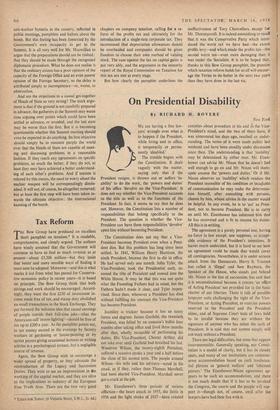Tax Reform
THE Bow Group have produced an excellent short pamphlet on taxation.* It is readable, comprehensive, and closely argued. The authors have wisely assumed that the Government will continue to have to find as much revenue as at present—about £5,200 million—but they insist that better and more sensible ways of finding it must now be adopted. Moreover—and this is what marks it out from what has passed for Conserva- tive economic policy in recent years—it is based on principle. The Bow Group think that both savings and work should be encouraged. Accord- ingly, they want the first £250 of investment in- come made free of tax, and stamp duty abolished on small transactions in the Stock Exchange. They put forward the welcome idea that casual earnings of people outside their full-time jobs—what the Americans call `moon-lighting'—should be free of tax up to £200 a year. As the pamphlet points out, to tax money earned in the evenings by factory workers at gardening or house-painting or by surtax payers giving occasional lectures or writing articles is a psychological irritant, but a negligible source of revenue.
Again, the Bow Group wish to encourage a wider spread of property, so they advocate the reintroduction of the Legacy and Succession Duties. They wish to see an improvement in She working of the capital market, and they are alive to the implications to industry of the European Free Trade Area. There are the two very good * TAXES FOR TODAY. (6 Victoria Street, S.W.1., 2s. 6d.) chapters on company taxation, calling for a re- form of the profits tax and ultimately for the introduction of a single-rate corporate tax. They recommend that depreciation allowances should be overhauled and companies should be given freedom to choose their own method of valuing stock. The case against the tax on capital gains is put very ably, and the arguments in the minority report of the Royal Commission on Taxation for this tax are met at every stage.
But how clearly the pamphlet underlines the ineffectiveness of Tory Chancellors, except for Mr. Thorneycroft. It is indeed astonishing to recall that it was the Conservative Party which intro- duced the worst tax we have had—the excess profits levy—and which made the profits tax—the second worst tax—even more damaging than it was under the Socialists. It is to be hoped that, thanks to this Bow Group pamphlet, the promise which taxation reform holds for us all will encour- age the Tories to do better in the next two years than they have done in the last six.


































 Previous page
Previous page